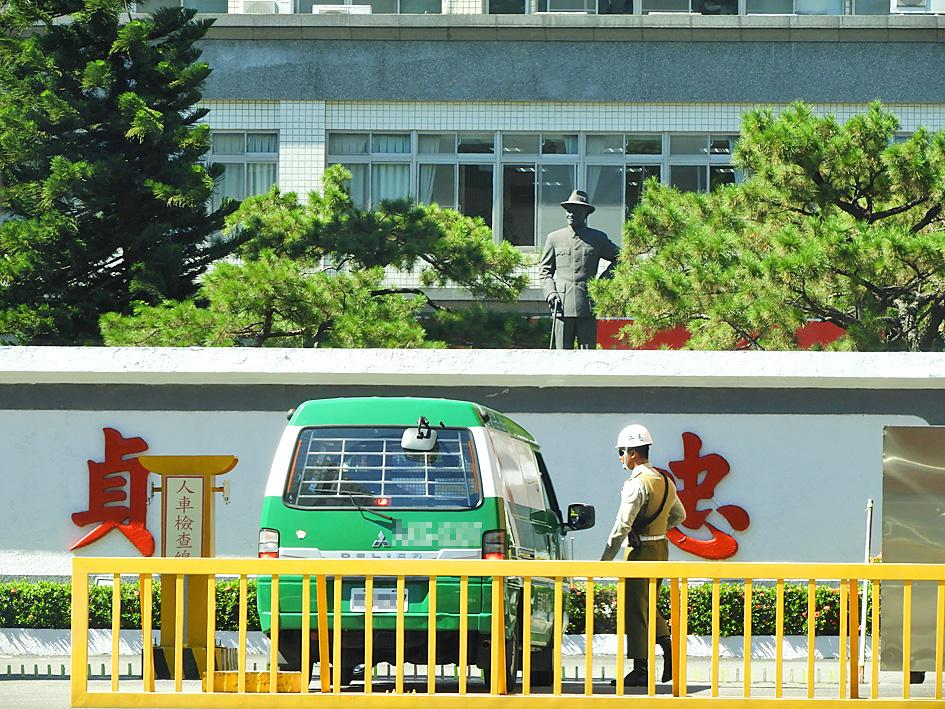Taiwan Republic Office director Chilly Chen (陳峻涵) was on Friday ordered confined to his home after allegedly throwing eggs at a Chiang Kai-shek (蔣介石) statue in the Chiang Kai-shek Memorial Hall.
The Taipei District Prosecutors’ Office ordered Chen to remain in his residence for allegedly contravening the Cultural Heritage Protection Act (文化資產保存法).
Chen said his actions were in protest of comments made by Minister of Culture Lee Yung-te (李永得), who on Wednesday said he did not support the removal of the statue, as protesters seeking to get rid of the sculpture have been taking “a more moderate approach.”

Photo: Chen Yu-fu, Taipei Times
“Lee’s comments take the tolerant nature of Taiwanese for weakness,” Chen said, adding that the remarks show disregard for the pain of the political victims of the former Chinese Nationalist Party (KMT) regime and their descendants.
Chen said that throwing eggs at the statue was his “non-moderate” method of expressing his view that there can be no justice if Chiang’s statue remains.
Taiwanese have endured the oppression of the KMT regime under Chiang, after the 228 Massacre and throughout the White Terror era, Chen said.
“We had hoped that with a localized party [the Democratic Progressive Party (DPP)] in power, holding a legislative majority, it would make known the truths of the massacres and hold the KMT to account for its past injustices and wrongs, and yet to this day Chiang’s statue is still enshrined at the hall,” he said.
Of the 848 Chiang statues in Taiwan, about 400, mostly at Ministry of National Defense and Veterans Affairs Council facilities, have not been processed for removal, government data showed.
Academics have called on the DPP government to present a clear policy on reducing the number of Chiang statues.
Lo Cheng-chung (羅承宗), a professor at the Institute of Financial and Economic Law at Southern Taiwan University of Science and Technology, on Thursday said that the first Chiang statue was set up in front of the Control Yuan on Dec 25, 1946.
In the decades that followed, county and city governments would erect Chiang statues to celebrate the KMT leader’s birthday, he said.
Lo said that President Tsai Ing-wen’s (蔡英文) administration should prioritize the removal of the statues.
Citing the statue at the memorial hall in particular, Lo said the Tsai government should not waste money on the changing of the guard for a statue of a person that few ever think of.
Additional reporting by Chen Yu-fu

The Grand Hotel Taipei on Saturday confirmed that its information system had been illegally accessed and expressed its deepest apologies for the concern it has caused its customers, adding that the issue is being investigated by the Ministry of Justice Investigation Bureau. The hotel said that on Tuesday last week, it had discovered an external illegal intrusion into its information system. An initial digital forensic investigation confirmed that parts of the system had been accessed, it said, adding that the possibility that some customer data were stolen and leaked could not be ruled out. The actual scope and content of the affected data

‘LIKE-MINDED PARTNER’: Tako van Popta said it would be inappropriate to delay signing the deal with Taiwan because of China, adding he would promote the issue Canadian senators have stressed Taiwan’s importance for international trade and expressed enthusiasm for ensuring the Taiwan-Canada trade cooperation framework agreement is implemented this year. Representative to Canada Harry Tseng (曾厚仁) in an interview with the Central News Agency (CNA) said he was increasingly uneasy about Ottawa’s delays in signing the agreement, especially as Ottawa has warmed toward Beijing. There are “no negotiations left. Not only [is it] initialed, we have three versions of the text ready: English, French and Mandarin,” Tseng said. “That tells you how close we are to the final signature.” Tseng said that he hoped Canadian Prime Minister Mark Carney

President William Lai (賴清德) yesterday bestowed one of Taiwan’s highest honors on Saint Vincent and the Grenadines (SVG) Ambassador Andrea Clare Bowman in recognition of her contributions to bilateral ties. “By conferring the Order of Brilliant Star with Grand Cordon on Ambassador Bowman today, I want to sincerely thank her, on behalf of the Taiwanese people, for her outstanding contribution to deepening diplomatic ties between Taiwan and SVG,” Lai said at a ceremony held at the Presidential Office in Taipei. He noted that Bowman became SVG’s first ambassador to Taiwan in 2019 and

A man walks past elementary school artworks at the Taipei Lantern Festival in Ximen District yesterday, the first day of the event. The festival is to run from 5pm to 10pm through March 15.